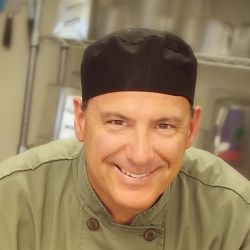How To Make Chicken Stock!
I’ve always wanted to do this!
After reading so much about the health benefits of bone broth (a.k.a stock) from books like Deep Nutrition and Nourishing Traditions, I figured it was about time to make it myself.
But I didn’t want to just wing it.
So, I got called on the experts to help me put it all together. Luke and Dr. Cate Shanahan, co-authors of Deep Nutrition: Why Your Genes Need Traditional Foods, joined me yesterday via Skype to coach me through the process.
I know, you can barely see their faces in the video. My bad! The Ustream link below has a better angle.
If you’re following along from home, here’s what you’ll need:
The Main Ingredients
* 2 chicken carcasses – I had Allyson the Assistant pick up a couple of organic rotisserie chickens from Whole Foods
* clean water – of course!
* some cheap white wine – we got the cheapest
* a big ass pot
The Veggies
* 4-5 medium carrots – peel ’em and cut ’em into 3-4 pieces each
* 3 stalks of celery – also cut into 3-4 pieces
* 2 onions – chop ’em (careful, they’ll make you cry)
The Spices
* thyme
* bay leaves
* pepper corns
* parsley
* seal salt
It’s was simpler than I thought it would be. Here’s how it goes down.

 by Sean Croxton
by Sean Croxton by Sean Croxton
by Sean Croxton








